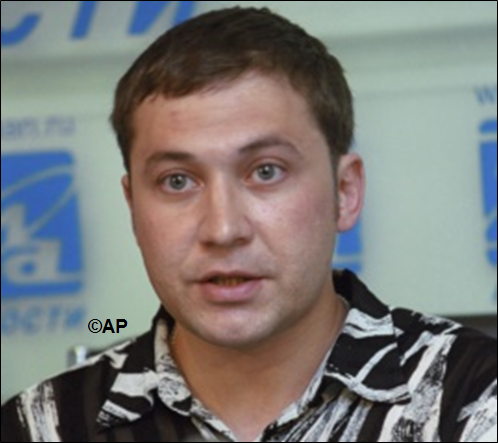Fact:
On April 3, 2017, the day Vladimir Putin was due to visit the city, a suicide bombing was carried out in the St. Petersburg metro, killing 15 people and injuring 64. An al-Qaeda affiliate, Imam Shamil Battalion, claimed responsibility.
Salim Hasan Khalifa Rashid al-Kuwari is a Qatari-based financier and facilitator for al-Qaeda.“Treasury Targets Key Al-Qa’ida Funding and Support Network Using Iran as a Critical Transit Point,” U.S. Department of the Treasury, July 28, 2011, https://home.treasury.gov/news/press-releases/tg1261#:~:text=WASHINGTON%20%E2%80%93%20The%20U.S.%20Department%20of,ida%20and%20the%20Iranian%20government. The subject of U.S. sanctions, Kuwari has channeled hundreds of thousands of dollars to al-Qaeda through an Iran-based network run by senior al-Qaeda facilitator Ezedine Abdel Aziz Khalil. Kuwari has also allegedly facilitated the travel of extremist recruits abroad and secured the release of al-Qaeda detainees in Iran.“Treasury Targets Key Al-Qa’ida Funding and Support Network Using Iran as a Critical Transit Point,” U.S. Department of the Treasury, July 28, 2011, https://home.treasury.gov/news/press-releases/tg1261#:~:text=WASHINGTON%20%E2%80%93%20The%20U.S.%20Department%20of,ida%20and%20the%20Iranian%20government.
Qatari authorities previously arrested Kuwari for suspicion of terrorism offences in 2009 and 2011, but released him both times after Alkarama—an organization co-founded by U.S.-designated Qatari-based terrorist financier Abd al-Rahman bin Umayr al-Nuaymi—pressed Kuwari’s case with the United Nations.“Qatar: Civil servant held without charge,” Alkarama, May 18, 2011, http://en.alkarama.org/qatar/733-qatar-civil-servant-held-without-charge. According to a 2014 investigative report by the Telegraph, Kuwari was employed by Qatar’s Ministry of Interior during both arrests.Robert Mendick, “Al-Qaeda terror financier worked for Qatari government,” Telegraph (London), October 12, 2014, http://www.telegraph.co.uk/news/11156327/Al-Qaeda-terror-financier-worked-for-Qatari-government.html.
In 2011, the U.S. Department of the Treasury designated Kuwari as a Specially Designated Global Terrorist (SDGT) under Executive Order 13224. Kuwari’s second release came three months after the U.S. designated him as an al-Qaeda fundraiser.“Treasury Targets Key Al-Qa’ida Funding and Support Network Using Iran as a Critical Transit Point,” U.S. Department of the Treasury, July 28, 2011, https://www.treasury.gov/press-center/press-releases/Pages/tg1261.aspx. A 2014 Telegraph report alleged that Qatar’s Ministry of Interior had continued to employ Kuwari after his 2011 designation, though the Qatari government refused to verify his employment.Robert Mendick, “Al-Qaeda terror financier worked for Qatari government,” Telegraph (London), October 12, 2014, http://www.telegraph.co.uk/news/11156327/Al-Qaeda-terror-financier-worked-for-Qatari-government.html.

The U.S. Department of the Treasury designated “Salim Hasan Khalifa Rashid al-Kuwari” as a Specially Designated Global Terrorist on July 28, 2011.“Treasury Targets Key Al-Qa’ida Funding and Support Network Using Iran as a Critical Transit Point,” U.S. Department of the Treasury, July 28, 2011, https://home.treasury.gov/news/press-releases/tg1261#:~:text=WASHINGTON%20%E2%80%93%20The%20U.S.%20Department%20of,ida%20and%20the%20Iranian%20government.

Khalifa Muhammad Turki al-Subaiy is an internationally designated terrorist financier and facilitator based in Qatar. He has allegedly funneled hundreds of thousands of dollars to al-Qaeda senior leaders in South Asia, including 9/11 mastermind Khalid Sheikh Mohammed. Subaiy has also funded the transit of al-Qaeda recruits to South Asia for terrorist training.“Treasury Designates Gulf-Based al Qaida Financiers,” U.S. Department of the Treasury, June 5, 2008, http://www.treasury.gov/press-center/press-releases/Pages/hp1011.aspx. In October 2014, a Telegraph report alleged that Subaiy was funding al-Qaeda-linked terrorism in Iraq and Syria.Robert Mendick, “Banker who financed 9/11 mastermind now funding terrorists in Syria and Iraq,” Telegraph, October 4, 2014, http://www.telegraph.co.uk/news/worldnews/middleeast/syria/11140190/Banker-who-financed-911-mastermind-now-funding-terrorists-in-Syria-and-Iraq.html.
Subaiy was a one-time employee of Qatar’s Central Bank, and reportedly one of Qatar’s “senior state employees” as of 2007.David Andrew Weinberg, “Qatar and Terror Finance Part 1: Negligence,” Foundation for Defense of Democracies, December 2014, 16, https://www.defenddemocracy.org/content/uploads/publications/Qatar_Part_I.pdf. According to the U.N. Security Council, Subaiy began financing al-Qaeda leaders in South Asia in the mid-2000s. In January 2008, the Bahrain High Criminal Court convicted Subaiy in absentia on charges of terrorist financing. Subaiy was arrested in Qatar in March 2008 and served a six-month prison sentence. After his release, Subaiy allegedly reconnected with Middle East-based al-Qaeda financiers and resumed funding for the terror group.“QDi.253KHALIFA MUHAMMAD TURKI AL-SUBAIY,” U.N. Security Council, last updated February 19, 2015, https://www.un.org/sc/suborg/en/sanctions/1267/aq_sanctions_list/summaries/individual/khalifa-muhammad-turki-al-subaiy;
“Consolidated U.N. Security Council Sanctions List,” U.N. Security Council, updated December 27, 2016, https://scsanctions.un.org/fop/fop?xml=htdocs/resources/xml/en/consolidated.xml&xslt=htdocs/resources/xsl/en/consolidated.xsl.
As of early 2011, Subaiy had funneled hundreds of thousands of dollars to senior al-Qaeda leaders in Pakistan.“Treasury Designates Twelve Foreign Terrorist Fighter Facilitators,” U.S. Department of the Treasury, September 24, 2014, http://www.treasury.gov/press-center/press-releases/Pages/jl2651.aspx. In mid-2012, Subaiy transferred hundreds of thousands of dollars intended for al-Qaeda leaders with the help of al-Qaeda financier Ashraf Muhammad Yusuf Uthman Abd al-Salam.“Treasury Designates Twelve Foreign Terrorist Fighter Facilitators,” U.S. Department of the Treasury, September 24, 2014, http://www.treasury.gov/press-center/press-releases/Pages/jl2651.aspx. In 2013, Subaiy solicited donations over Facebook for a fundraising campaign for Syria headed by U.S.-designated al-Qaeda-financier Sa’d bin Sa’d Muhammad Shariyan Al Ka’bi.“Use of Social Media by Terrorist Fundraisers & Financiers,” Camstoll Group, April 2016, 9, https://www.camstoll.com/wp-content/uploads/2016/04/Social-Media-Report-4.22.16.pdf. By October 2014, the Telegraph reported that Subaiy was continuing to fundraise for Islamists in Iraq and Syria, despite being the subject of U.S. and U.N. sanctions.Robert Mendick, “Banker who financed 9/11 mastermind now funding terrorists in Syria and Iraq,” Telegraph, October 4, 2014, http://www.telegraph.co.uk/news/worldnews/middleeast/syria/11140190/Banker-who-financed-911-mastermind-now-funding-terrorists-in-Syria-and-Iraq.html.
The U.N. Security Council added Subaiy to its Al-Qaida Sanctions List in October 2008.“QDi.253 KHALIFA MUHAMMAD TURKI AL-SUBAIY,” U.N. Security Council, last updated February 19, 2015, https://www.un.org/sc/suborg/en/sanctions/1267/aq_sanctions_list/summaries/individual/khalifa-muhammad-turki-al-subaiy. Nonetheless, Subaiy continued to access his bank accounts in Qatar through at least 2013, according to a June 2019 Wall Street Journal report. The report found that the United Nations permitted Subaiy and others on its sanctions list to access their bank accounts for so-called basic necessities. Subaiy reportedly took out up to $10,000 a month from frozen accounts.Ian Talley and Bradley Hope, “Accused Terrorists Use Loopholes to Tap Frozen Funds,” Wall Street Journal, June 19, 2019, https://www.wsj.com/articles/accused-terrorists-use-loopholes-to-tap-frozen-funds-11560977005. The revelation prompted international calls for the United Nations to fix the loopholes that allow for designated individuals to access financial systems with U.N. approval.“Terror group funding loophole must be closed,” The National, June 20, 2019, https://www.thenational.ae/opinion/editorial/terror-group-funding-loophole-must-be-closed-1.877040.
The United Nations amended the sanctions against Subaiy on March 23, 2021, to include updated passport and location information.“Security Council ISIL (Da’esh) and Al-Qaida Sanctions Committee Amends Eight Entries on Its Sanctions List,” United Nations, March 23, 2021, https://www.un.org/press/en/2021/sc14473.doc.htm. The Security Council removed Subaiy from its designations list on September 6, 2021, after receiving a legal request from Subaiy to delist him. The delisting nullified the U.N. assets freeze, travel ban, and arms embargo against Subaiy.“Security Council ISIL (Da’esh) and Al-Qaida Sanctions Committee Removes One Entry from Its Sanctions List,” United Nations, September 6, 2021, https://www.un.org/press/en/2021/sc14622.doc.htm. The United Kingdom lifted its sanctions on Subaiy the following day.Financial Sanctions Notice, U.K. Office of Financial Sanctions Implementation – HM Treasury, September 7, 2021, https://assets.publishing.service.gov.uk/government/uploads/system/uploads/attachment_data/file/1015669/Notice_ISIL__Da_esh__and_Al-Qaida_070921.pdf. The European Union lifted its sanctions against Subaiy on September 9, 2021.“COMMISSION IMPLEMENTING REGULATION (EU) 2021/1460 of 9 September 2021,” EUR-Lex, September 9, 2021, https://eur-lex.europa.eu/legal-content/EN/TXT/?uri=CELEX%3A32021R1460&qid=1638199969002. Subaiy remains designated in the United States.
Despite the international sanctions against him, Subaiy also continued to post to social media through at least 2016. Images of him driving sports cars and holding a lion on a leash appeared on his Facebook, Twitter, and Instagram accounts. A 2016 report by the Camstoll Group found that Subaiy also used the social media platforms “to communicate with followers and endorse fundraising campaigns….”Khaled Yacoub Oweis, “Suspected Al Qaeda financier impervious to its austere creed,” The National, June 20, 2019, https://www.thenational.ae/world/suspected-al-qaeda-financier-impervious-to-its-austere-creed-1.877109; Jaber Al Joodi, “Who is Khalifa al-Subaiy, former banker named among Qatar-linked terrorists?” Al Arabiya, June 10, 2017, https://english.alarabiya.net/en/features/2017/06/10/Who-is-Khalifa-al-Subaiy-who-is-named-among-Qatar-linked-terrorists-.html. The accounts have since been deleted as of June 2019.

The U.S. Department of the Treasury designated Khalifa Muhammad Turki al-Subaiy a Specially Designated Global Terrorist (SDGT) under Executive Order 13224 on June 5, 2008.“Treasury Designates Twelve Foreign Terrorist Fighter Facilitators,” U.S. Department of the Treasury, September 24, 2014, http://www.treasury.gov/press-center/press-releases/Pages/jl2651.aspx.

The U.N. Security Council added “Khalifa Muhammad Turki al-Subaiy” to its Al-Qaida Sanctions List on October 10, 2008.“QDi.253 KHALIFA MUHAMMAD TURKI AL-SUBAIY,” U.N. Security Council, last updated February 19, 2015, https://www.un.org/sc/suborg/en/sanctions/1267/aq_sanctions_list/summaries/individual/khalifa-muhammad-turki-al-subaiy. The Security Council removed Subaiy on September 6, 2021.“Security Council ISIL (Da’esh) and Al-Qaida Sanctions Committee Removes One Entry from Its Sanctions List,” United Nations, September 6, 2021, https://www.un.org/press/en/2021/sc14622.doc.htm.

The European Union designated “‘Khalifa Muhammad Turki Al-Subaiy” on October 10, 2008.“COMMISSION IMPLEMENTING REGULATION (EU) 2015/480 of 20 March 2015,” EUR-Lex, March 20, 2015, https://eur-lex.europa.eu/legal-content/EN/TXT/?uri=CELEX%3A32015R0480. The European Union removed sanctions on September 9, 2021.“COMMISSION IMPLEMENTING REGULATION (EU) 2021/1460 of 9 September 2021,” EUR-Lex, September 9, 2021, https://eur-lex.europa.eu/legal-content/EN/TXT/?uri=CELEX%3A32021R1460&qid=1638199969002.




Saudi Arabia, the United Arab Emirates, Egypt, and Bahrain collectively designated on their terror lists Khalifa Mohammed Turki al-Subaie in June 2017.“Arab powers list 59 individuals as Qatar-linked terrorism supporters,” Al Arabiya, June 9, 2017, https://english.alarabiya.net/en/News/gulf/2017/06/09/Arab-countries-release-list-of-terrorist-financiers-supported-by-Qatar.html.

Nicholas Young is a U.S. citizen, former law enforcement officer, and alleged Islamic extremist. He was arrested in Washington D.C. in August 2016 for attempting to provide support to ISIS. According to the FBI, in July 2016, Young sent electronic gift cards worth $245 to an undercover FBI agent posing as a Syrian-based foreign fighter for ISIS. The agent had reportedly told Young that the funds would help develop “messaging accounts” to be used to recruit westerners to ISIS.Justin Wm. Moyer, “’I make friends easily’: How Nicholas Young allegedly supported the Islamic State,” Washington Post, August 3, 2016, https://www.washingtonpost.com/news/local/wp/2016/08/03/i-make-friends-easily-how-nicholas-young-allegedly-supported-the-islamic-state/?utm_term=.80f3e7b87482;
“United States of America v. Nicholas Young,” United States District Court for the Eastern District of Virginia, August 2, 2016, 3, http://apps.washingtonpost.com/g/documents/local/us-vs-nicholas-young/2108/. In December 2017, Young was found guilty of his charges, which included attempting to provide material support to ISIS and obstruction of justice. He faces a sentence of up to 60 years in prison.“Jury Convicts Former Police Officer,” U.S. Department of Justice, December 18, 2017, https://www.justice.gov/opa/pr/jury-convicts-former-police-officer-attempting-support-isis. A convert to Islam, Young is the first law enforcement officer in the United States to be arrested and convicted for supporting a terrorist group.Rachel Weiner, “Police officer for D.C. subway system accused of trying to help ISIS,” Washington Post, August 3, 2016, https://www.washingtonpost.com/local/public-safety/metro-police-officer-arrested-on-terrorism-charges/2016/08/03/6b7541de-5981-11e6-9aee-8075993d73a2_story.html?utm_term=.2babb445631b; Rachel Weiner, “Former D.C. area police officer found guilty of trying to back Islamic State,” Washington Post, December 18, 2017, https://www.washingtonpost.com/local/public-safety/former-dc-area-police-officer-found-guilty-of-attempting-to-back-islamic-state/2017/12/18/0bbca6b2-e40c-11e7-833f-155031558ff4_story.html.
The FBI first took an interest in Young because of his friendship with Zachary Chesser, a Virginia man who pled guilty to attempting to provide material support to al-Shabab.Justin Wm. Moyer, “’I make friends easily’: How Nicholas Young allegedly supported the Islamic State,” Washington Post, August 3, 2016, https://www.washingtonpost.com/news/local/wp/2016/08/03/i-make-friends-easily-how-nicholas-young-allegedly-supported-the-islamic-state/?utm_term=.80f3e7b87482. During the FBI’s first interview with Young in September 2010, Young professed shock at the mention of Chesser’s July 2010 arrest, adding that it would be his “religious and personal duty” to inform someone should he become aware of any terrorist plotting.“United States of America v. Nicholas Young,” United States District Court for the Eastern District of Virginia, August 2, 2016, 3, http://apps.washingtonpost.com/g/documents/local/us-vs-nicholas-young/2108/.
In interviews with FBI officers and conversations with undercover agents between 2010 and 2015, Young disclosed that he tortured animals as a child, was a collector of Nazi memorabilia, and dressed up as “Jihadi John” for a party. He also expressed support for the January 2015 Charlie Hebdo attacks in Paris, boasted that he would decapitate anyone who betrayed him, and provided counsel on avoiding issues at Turkish border control.Justin Wm. Moyer, “’I make friends easily’: How Nicholas Young allegedly supported the Islamic State,” Washington Post, August 3, 2016, https://www.washingtonpost.com/news/local/wp/2016/08/03/i-make-friends-easily-how-nicholas-young-allegedly-supported-the-islamic-state/?utm_term=.80f3e7b87482;
United States of America v. Nicholas Young,” United States District Court for the Eastern District of Virginia, August 2, 2016, 9, 11, http://apps.washingtonpost.com/g/documents/local/us-vs-nicholas-young/2108/.
According to his own account, in 2011 Young traveled twice to Libya to join rebel militants and fight against the regime of then-President Muammar Gaddafi.Khaleda Rahman, “DC transit officer is charged after ‘trying to help ISIS’ after years of communication with FBI source posing as jihadist , traveling to Libya twice and praising the Charlie Hebdo attacks,” Daily Mail (London), August 3, 2016, http://www.dailymail.co.uk/news/article-3721941/DC-transit-police-officer-charged-trying-help-ISIS.html. He traveled with “body armor, a Kevlar helmet, and several other military-style items,” according to the criminal complaint. Although initially turned away at the Libyan border by Egyptian border control, he took a direct flight from Tunisia to Libya on his second journey.United States of America v. Nicholas Young,” United States District Court for the Eastern District of Virginia, August 2, 2016, 6, http://apps.washingtonpost.com/g/documents/local/us-vs-nicholas-young/2108/.
Young is being held at a Virginia detention center.Rachel Weiner, “Former Metro officer accused of trying to aid ISIS moved our of Alexandra jail,” Washington Post, October 4, 2016, https://www.washingtonpost.com/local/public-safety/former-metro-officer-accused-of-trying-to-aid-isis-moved-out-of-alexandria-jail/2016/10/04/6ee3ec44-8a5f-11e6-bff0-d53f592f176e_story.html?utm_term=.6c7f4e96eeaa.
Former police officer arrested in August 2016 and convicted in December 2017 for conspiring to provide material support to ISIS. Sent electronic gift cards to an undercover FBI operative posing as an ISIS foreign fighter.
Watched ISIS videos while on break from work.

U.S.-sanctioned Abdallah al-Muhaysini is a senior leader in al-Qaeda’s Syrian-based al-Nusra Front, having served at various times as a recruiter, fundraiser, and religious advisor for the terrorist group.“Treasury Designates Key Al-Nusrah Front Leaders,” U.S. Department of the Treasury, November 10, 2016, https://www.treasury.gov/press-center/press-releases/Pages/jl0605.aspx. Muhaysini has raised millions of dollars for al-Nusra Front, boasting of having raised at least $5 million through a variety of terrorist fronts. In April 2016, Muhaysini launched a campaign to recruit 3,000 child and teenage soldiers from across northern Syria. In addition to fundraising and recruiting on behalf of al-Nusra Front, Muhaysini has also served at various times as its military strategist and political representative.“Treasury Designates Key Al-Nusrah Front Leaders,” U.S. Department of the Treasury, November 10, 2016, https://www.treasury.gov/press-center/press-releases/Pages/jl0605.aspx.
Muhaysini was born in 1987 in the Qassim region of north-central Saudi Arabia. After having reportedly memorized the Quran by the age of 15, Muhaysini graduated from the University of Umm al-Qura in Mecca with a degree in sharia (Islamic law).Aaron Y. Zelin, “The Saudi Foreign Fighter Presence in Syria,” Combatting Terrorism Center at West Point, April 28, 2014, https://www.ctc.usma.edu/posts/the-saudi-foreign-fighter-presence-in-syria. Muhaysini earned his doctorate degree soon after from the Imam Muhammad ibn Saud Islamic University in Riyadh, where he studied under extremist, al-Qaeda-affiliated propagandist Sulayman al-Ulwan. After serving as the imam at the Qatar mosque in Mecca, Muhaysini left for Syria in or around 2013, where he quickly took up with al-Nusra Front. He was photographed alongside notorious Chechen Nusra commander Omar al-Shishani, and has admitted to having spoken with al-Qaeda leader Ayman al-Zawahiri by phone.Aaron Y. Zelin, “The Saudi Foreign Fighter Presence in Syria,” Combatting Terrorism Center at West Point, April 28, 2014, https://www.ctc.usma.edu/posts/the-saudi-foreign-fighter-presence-in-syria. Before he became the target of U.S. sanctions in November 2016, Muhaysini maintained an English-language Twitter account under the handle @Muhaysini_EN, where Muhaysini—despite his affiliation with al-Nusra Front—claimed to be an “immigrant to Shaam [Syria]” and “an independent student of knowledge who doesn’t belong to any [rebel] faction.”Thomas Joscelyn, “US Treasury designates Saudi jihadist cleric, three others in Syria,” Long War Journal, November 10, 2016, http://www.longwarjournal.org/archives/2016/11/us-treasury-designates-saudi-jihadist-cleric-three-others-in-syria.php. Before finally being suspended in November 2016, Muhaysini’s Twitter account had reached more than 60,000 followers.Rukmini Callimachi, “Protest of U.S. Terror Listing Offers a Glimpse at Qaeda Strategy,” New York Times, November 17, 2016, https://www.nytimes.com/2016/11/18/world/middleeast/protest-of-us-terror-listing-offers-a-glimpse-at-qaeda-strategy.html.
Muhaysini was sanctioned by the U.S. government for his role in al-Nusra Front on November 10, 2016.“Treasury Designates Key Al-Nusrah Front Leaders,” U.S. Department of the Treasury, November 10, 2016, https://www.treasury.gov/press-center/press-releases/Pages/jl0605.aspx. In an interview with the New York Times released the following week, Muhaysini denied any affiliation with al-Qaeda and claimed that Syrians were outraged at the designation since he was a “national symbol” for the Syrian people. As the Times reports, however, Muhaysini has used his social media profile to eulogize deceased al-Qaeda leaders and encourage suicide bombers to carry out attacks. As the Times notes, Muhaysini was even profiled in one of al-Qaeda’s magazines, Al Risalah.Rukmini Callimachi, “Protest of U.S. Terror Listing Offers a Glimpse at Qaeda Strategy,” New York Times, November 17, 2016, https://www.nytimes.com/2016/11/18/world/middleeast/protest-of-us-terror-listing-offers-a-glimpse-at-qaeda-strategy.html.
In September 2017, Muhaysini announced his resignation from Hay’at Tahrir al Sham (HTS), a group formed from a merger of al-Nusra Front and several smaller groups. He complained about the infighting between HTS and Ahrar al-Sham and leaked audio recordings that exposed that some within HTS had it out for him, citing these as the reasons for his resignation.Thomas Joscelyn, “Al Qaeda again addresses factional infighting in Syria,” Long war Journal, March 24, 2018, https://www.longwarjournal.org/archives/2018/03/al-qaeda-again-addresses-factional-infighting-in-syria.php. He has also survived two assassination attempts. The first by a suicide bomber in June 2017 left him unharmed and the second in April 2018 by a road side bomb wounded him.Angus McDowall, “Militant Saudi cleric survives assassination attempt in Syria,” Reuters, June 16, 2017, https://www.reuters.com/article/us-mideast-crisis-syria-assassination/militant-saudi-cleric-survives-assassination-attempt-in-syria-idUSKBN1972AJ; “Abdullah Al-Muhaysini Wounded in Assassination Attempt in Syria's Idlib,” Fars News Agency, April 28, 2018, http://en.farsnews.com/newstext.aspx?nn=13970208000469.
In September 2018, after a Turkish book accused Muhaysini of hostility towards Turkish President Recep Tayyip Erdoğan, Muhaysini responded in defense of the president. He called Erdoğan “a diligent Muslim . . . who is trying to reform his country, and support the issues of Muslims,” praising him for moving Turkey away from secularism.Thomas Joscelyn and Caleb Weiss, “Jihadi Ideologues Argue of Turkey’s Erdogan,” FDD’s Long War Journal, September 28, 2020, https://www.longwarjournal.org/archives/2020/09/jihadist-ideologues-argue-over-turkeys-erdogan.php. This drew a rebuke from jihadi ideologue Abu Muhammad al-Maqdisi, who argued that supporting Erdoğan is a “dilution of ideology.” Maqdisi cited Turkey’s participation in NATO, the invasion of Afghanistan, recognition of the “apostate government of Somalia,” and respect for established international borders to indict jihadist supporters of Erdoğan. Muhaysini responded to this criticism by claiming Maqdisi is not a real sheikh and thus has no authority to issue fatwa. He also accused Maqdisi of harming the jihad in Afghanistan, Iraq, and Syria by his overly harsh application of takfir, of disparaging the names of Hamas co-founder Ahmed Yassin and jihad “godfather” Abdullah Azzam, and of being excessively lenient towards elements of ISIS.Thomas Joscelyn and Caleb Weiss, “Jihadi Ideologues Argue of Turkey’s Erdogan,” FDD’s Long War Journal, September 28, 2020, https://www.longwarjournal.org/archives/2020/09/jihadist-ideologues-argue-over-turkeys-erdogan.php.

On November 10, 2016 Abdallah Muhammad Bin-Sulayman al-Muhaysini was designated under Executive Order 13224 for providing support and services to al-Nusrah Front.“Treasury Designates Key Al-Nusrah Front Leaders,” U.S. Department of the Treasury, November 10, 2016, https://www.treasury.gov/press-center/press-releases/Pages/jl0605.aspx.

Muhammad Ghumayn is an Algerian citizen and U.S.-designated senior al-Qaeda leader based in Iran. The U.S. Treasury sanction-designated Bayumi in July 2016 alongside two other Iran-based al-Qaeda operatives—Yisra Bayumi and Faisal al-Khalidi—for their financial and logistical support of al-Qaeda.“Treasury Designates Three Senior Al-Qaida Operatives,” U.S. Department of the Treasury, July 20, 2016, https://www.treasury.gov/press-center/press-releases/Pages/jl0523.aspx. The Treasury described the three men as “senior al-Qaeda veterans.”Treasury Designates Three Senior Al-Qaida Operatives,” U.S. Department of the Treasury, July 20, 2016, https://www.treasury.gov/press-center/press-releases/Pages/jl0523.aspx;
Tyler Pager, “U.S. Treasury sanctions three Iran-based Al Qaeda members,” Politico, July 20, 2016, http://www.politico.com/story/2016/07/al-qaeda-us-sanctions-225871.
According to Adam Szubin, acting undersecretary of Treasury for terrorism and financial intelligence, the men have been “responsible for moving money and weapons across the Middle East.”“Treasury Designates Three Senior Al-Qaida Operatives,” U.S. Department of the Treasury, July 20, 2016, https://www.treasury.gov/press-center/press-releases/Pages/jl0523.aspx. The designation notice noted that the men are based in Iran, though the Iranian foreign ministry has denied this.“Iran denies presence of Al-Qaeda operatives,” Daily Star (Beirut), July 26, 2016, https://www.dailystar.com.lb/Entity/People/152618493/Faisal-Jassim-Mohammed-Al-Amri-Al-Khalidi.ashx?utm_source=Magnet&utm_medium=Entities%20widget&utm_campaign=Magnet%20tools.
Ghumayn is described by the U.S. Treasury as “a senior [al-Qaeda] leader.” He appears to serve several important roles with respect to intelligence, communications, financing, logistics, and security. The U.S. Treasury stated that Ghumayn took control of finance and organization of Iran-based al-Qaeda members in 2015.ldquo;Treasury Designates Three Senior Al-Qaida Operatives,” U.S. Department of the Treasury, July 20, 2016, https://www.treasury.gov/press-center/press-releases/Pages/jl0523.aspx.
|
|

Yisra Bayumi is an Egyptian citizen and U.S.-designated financier for al-Qaeda based in Iran. The U.S. Treasury sanction-designated Bayumi in July 2016 alongside two other Iran-based al-Qaeda operatives—Faisal al-Khalidi and Abu Bakr Muhammad Ghumayn—for their financial and logistical support of al-Qaeda.“Treasury Designates Three Senior Al-Qaida Operatives,” U.S. Department of the Treasury, July 20, 2016, https://www.treasury.gov/press-center/press-releases/Pages/jl0523.aspx. The Treasury described the three men as “senior al-Qaeda veterans.”Treasury Designates Three Senior Al-Qaida Operatives,” U.S. Department of the Treasury, July 20, 2016, https://www.treasury.gov/press-center/press-releases/Pages/jl0523.aspx;
Tyler Pager, “U.S. Treasury sanctions three Iran-based Al Qaeda members,” Politico, July 20, 2016, http://www.politico.com/story/2016/07/al-qaeda-us-sanctions-225871.
According to Adam Szubin, acting undersecretary of Treasury for terrorism and financial intelligence, the men have been “responsible for moving money and weapons across the Middle East.”“Treasury Designates Three Senior Al-Qaida Operatives,” U.S. Department of the Treasury, July 20, 2016, https://www.treasury.gov/press-center/press-releases/Pages/jl0523.aspx. The designation notice noted that the men are based in Iran, though the Iranian foreign ministry has denied this.“Iran denies presence of Al-Qaeda operatives,” Daily Star (Beirut), July 26, 2016, https://www.dailystar.com.lb/Entity/People/152618493/Faisal-Jassim-Mohammed-Al-Amri-Al-Khalidi.ashx?utm_source=Magnet&utm_medium=Entities%20widget&utm_campaign=Magnet%20tools.
Bayumi was described by the Treasury as “a veteran [al-Qaeda] member,” having joined the terrorist group in 2006 at the latest.“Treasury Designates Three Senior Al-Qaida Operatives,” U.S. Department of the Treasury, July 20, 2016, https://www.treasury.gov/press-center/press-releases/Pages/jl0523.aspx. According to the Treasury, Bayumi has served several important roles in al-Qaeda, including as a logistical and financial facilitator, mediator, and fund-raiser. He reportedly fundraised for al-Qaeda between 2014 and 2015, in which year he also secured funds for al-Qaeda from Syria. Throughout 2015, according to the Treasury, Bayumi also helped to free captive al-Qaeda members in Iran.“Treasury Designates Three Senior Al-Qaida Operatives,” U.S. Department of the Treasury, July 20, 2016, https://www.treasury.gov/press-center/press-releases/Pages/jl0523.aspx.

The U.S. Department of the Treasury designated Yisra Muhammad Ibrahim Bayumi as a Specially Designated Global Terrorist under Executive Order (E.O.) 13224 on July 20, 2016.“Treasury Designates Three Senior Al-Qaida Operatives,” U.S. Department of the Treasury, July 20, 2016, https://www.treasury.gov/press-center/press-releases/Pages/jl0523.aspx.

Mohamed Bailor Jalloh is a U.S. citizen and former member of the U.S. Army who pled guilty in October 2016 to attempting to provide material support to ISIS.“United States of America v. Mohamed Bailor Jalloh Affidavit in Support of a Criminal Complaint,” U.S. Department of Justice, July 3, 2016, 12, https://www.justice.gov/opa/file/873091/download. Jalloh admittedly attempted to donate money to the terror group and carry out a domestic attack in its name.“Former Army National Guard Member Arrested for Attempting to Provide Material Support to ISIL,” U.S. Department of Justice, June 5, 2016, https://www.justice.gov/opa/pr/former-army-national-guard-member-arrested-attempting-provide-material-support-isil.
Jalloh reportedly grew radicalized while serving in the Virginia National Guard between 2009 and 2015.Rachel Weiner and Joe Heim, “Former National Guardsman accused of plotting attack to support ISIS,” Washington Post, July 5, 2016, https://www.washingtonpost.com/local/public-safety/former-national-guardsman-accused-of-plotting-attack-to-support-isis/2016/07/05/317eb4f0-42c1-11e6-8856-f26de2537a9d_story.html. According to an FBI affidavit, Jalloh quit the National Guard after he began listening to lectures by deceased al-Qaeda in the Arabian Peninsula cleric Anwar al-Awlaki. Media reports referring to Awlaki as a “hate preacher” allegedly prompted Jalloh to research the Yemeni cleric and listen to his online lectures, according to the affidavit. During conversations with an FBI Confidential Human Source (CHS) in the first half of 2016, Jalloh allegedly said that Awlaki explained that it was incumbent upon every able Muslim to resist America in Iraq and Afghanistan. Jalloh also said that Awlaki’s lectures helped him to “understand” that after ISIS announced its so-called caliphate, “this was the reality.”“United States of America v. Mohamed Bailor Jalloh Affidavit in Support of a Criminal Complaint,” U.S. Department of Justice, July 3, 2016, 6, https://www.justice.gov/opa/file/873091/download.
Following service in the National Guard, Jalloh traveled to Africa, where he stayed between July 2015 and January 2016. While in Nigeria, according to FBI investigators, Jalloh first established contact with an ISIS operative who later introduced Jalloh to the CHS.“United States of America v. Mohamed Bailor Jalloh Affidavit in Support of a Criminal Complaint,” U.S. Department of Justice, July 3, 2016, 4, 7, https://www.justice.gov/opa/file/873091/download. Jalloh told the CHS in April 2016 that he wished to carry out a domestic attack similar to the Fort Hood shootings carried out by Nidal Hasan in 2009.“United States of America v. Mohamed Bailor Jalloh Affidavit in Support of a Criminal Complaint,” U.S. Department of Justice, July 3, 2016, 7, https://www.justice.gov/opa/file/873091/download. Jalloh also allegedly spoke about targeting an unidentified person who had organized several “Draw Muhammad” cartoon contests.“United States of America v. Mohamed Bailor Jalloh Affidavit in Support of a Criminal Complaint,” U.S. Department of Justice, July 3, 2016, 9, https://www.justice.gov/opa/file/873091/download.
In May 2016, the CHS introduced Jalloh to an undercover FBI agent posing as an ISIS member.“United States of America v. Mohamed Bailor Jalloh Affidavit in Support of a Criminal Complaint,” U.S. Department of Justice, July 3, 2016, 10, https://www.justice.gov/opa/file/873091/download. During conversations on an unidentified mobile messaging service, Jalloh allegedly told the agent that it was best to plan an attack during the Islamic holy month of Ramadan. He allegedly believed such violent operations were “100 percent the right thing to do,” and he prayed to Allah to make him a martyr.“United States of America v. Mohamed Bailor Jalloh Affidavit in Support of a Criminal Complaint,” U.S. Department of Justice, July 3, 2016, 8-9, https://www.justice.gov/opa/file/873091/download. Jalloh allegedly gave the agent $500, believing it would reach ISIS’s coffers.“United States of America v. Mohamed Bailor Jalloh Affidavit in Support of a Criminal Complaint,” U.S. Department of Justice, July 3, 2016, 12, https://www.justice.gov/opa/file/873091/download.
On July 1, 2016, Jalloh entered the Blue Ridge Arsenal gun store and firing range in Chantilly, Virginia. According to security footage and the store’s owner, Jalloh allegedly tried to purchase a Bushmaster AR-15, but did not have adequate identification.“United States of America v. Mohamed Bailor Jalloh Affidavit in Support of a Criminal Complaint,” U.S. Department of Justice, July 3, 2016, 13, https://www.justice.gov/opa/file/873091/download; Rachel Weiner and Joe Heim, “Former National Guardsman accused of plotting attack to support ISIS,” Washington Post, July 5, 2016, https://www.washingtonpost.com/local/public-safety/former-national-guardsman-accused-of-plotting-attack-to-support-isis/2016/07/05/317eb4f0-42c1-11e6-8856-f26de2537a9d_story.html. Jalloh returned the following day and purchased a Stag Arms 5.56 caliber assault rifle.“United States of America v. Mohamed Bailor Jalloh Affidavit in Support of a Criminal Complaint,” U.S. Department of Justice, July 3, 2016, 13, https://www.justice.gov/opa/file/873091/download. The FBI arrested him on July 3 and charged him with attempting to provide material support to ISIS. Jalloh pled guilty on October 27, 2016.“United States of America v. Mohamed Bailor Jalloh Affidavit in Support of a Criminal Complaint,” U.S. Department of Justice, July 3, 2016, 12, https://www.justice.gov/opa/file/873091/download. He was sentenced to 11 years in prison on February 10, 2017. In a letter to the court, alloh reportedly renounced ISIS and its “superficial and dishonest interpretation of Islam.”“Ex-Guardsman gets 11 years for Islamic State group support,” Associated Press, February 10, 2017, http://bigstory.ap.org/article/c575f77b512d49b4ac5cfa79012f1c05/ex-guardsman-be-sentenced-islamic-state-group-support.
Pled guilty in October 2016 to attempting to provide material support to ISIS. Attempted to assist in the procurement of weapons and money to be used in domestic terrorist plots.
Listened to lectures by now-deceased AQAP recruiter Anwar al-Awlaki online while serving in the U.S. National Guard.

Abdul Malik Abdul Kareem is a U.S. citizen, supporter of ISIS, and a convicted terrorist. Kareem helped to plot the May 2015 attack on the “Draw Muhammad” cartoon contest in Garland, Texas, alongside co-conspirators Elton Simpson and Nadir Soofi. In March of 2016, a federal jury convicted Kareem of providing material support to ISIS.David Schwartz, “Arizona man found guilty in 'Draw Mohammed' event shooting,” Reuters, March 17, 2016, http://www.reuters.com/article/us-arizona-shooting-verdict-idUSKCN0WJ306. On February 8, 2017, he was sentenced to 30 years in federal prison, followed by a lifetime of post-release supervision.“Arizona Man Sentenced to 30 Years for Conspiracy to Support ISIL and Other Federal Offenses,” U.S. Department of Justice Office of Public Affairs, February 8, 2017, https://www.justice.gov/opa/pr/arizona-man-sentenced-30-years-conspiracy-support-isil-and-other-federal-offenses; “Abdul Malik Abdul Kareem Sentenced to 30 Years,” ABC15 Arizona, February 8, 2017, https://www.abc15.com/news/region-phoenix-metro/central-phoenix/abdul-malik-abdul-kareem-sentenced-to-30-years. Kareem’s trial was the first U.S. jury trial involving an ISIS-inspired attack inside the United States.“Phoenix Man Convicted of Conspiracy to Support ISIL and Other Terrorism-Related Offenses,” U.S. Department of Justice, March 17, 2016, https://www.justice.gov/opa/pr/phoenix-man-convicted-conspiracy-support-isil-and-other-terrorism-related-offenses.
Law enforcement investigations into Kareem’s terrorist activity date back to 2012 when authorities searched his apartment and found extremist content on his computer.Associated Press, “FBI: Man tied to Texas shooting wanted to attack bigger target,” CBS News, June 17, 2015, http://www.cbsnews.com/news/phoenix-man-shooting-texas-prophet-muhammad-contest-super-bowl-fbi/. Kareem reportedly researched how to join ISIS in the Middle East before June 2014, when he is believed to have begun planning domestic attacks on behalf of ISIS alongside Simpson and Soofi.“Phoenix Man Convicted of Conspiracy to Support ISIL and Other Terrorism-Related Offenses,” U.S. Department of Justice, March 17, 2016, https://www.justice.gov/opa/pr/phoenix-man-convicted-conspiracy-support-isil-and-other-terrorism-related-offenses. Kareem subsequently asked Simpson and Soofi to live with him, and, according to the U.S. Department of Justice, “exhorted and encouraged” both men to carry out the attack on the “Draw Muhammad” cartoon contest, planned for May 3, 2015, in Garland, Texas.Associated Press, “FBI: Man tied to Texas shooting wanted to attack bigger target,” CBS News, June 17, 2015, http://www.cbsnews.com/news/phoenix-man-shooting-texas-prophet-muhammad-contest-super-bowl-fbi/; “United States of America v. Abdul Malik Abdul Kareem, aka Decarus Thomas,” U.S. District Court for the District of Arizona, December 22, 2015, 6.
In late 2014, Kareem began researching how to obtain explosives, according to prosecutors. Before deciding to attack the Garland event, Kareem’s possible targets included the Westgate Mall and the University of Phoenix Stadium in Glendale, Arizona, which was set to host Super Bowl XLIX on February 1, 2015.“United States of America v. Abdul Malik Abdul Kareem, aka Decarus Thomas,” U.S. District Court for the District of Arizona, December 22, 2015, 7.
Kareem, Simpson, and Soofi instead decided to target to the Garland cartoon contest.Fernanda Santos, “Guilty Verdict for Aiding in Attack on Anti-Islam Cartoon Event in Texas,” New York Times, March 17, 2016, http://www.nytimes.com/2016/03/18/us/garland-texas-attack-abdul-malik-abdul-kareem.html?_r=0. While Kareem was not present at the shooting on May 3, 2015, Assistant U.S. Attorney Joseph E. Koehler later referred to Kareem as the “motivator… bankroller…[and] trainer” behind the attack.Fernanda Santos, “Guilty Verdict for Aiding in Attack on Anti-Islam Cartoon Event in Texas,” New York Times, March 17, 2016, http://www.nytimes.com/2016/03/18/us/garland-texas-attack-abdul-malik-abdul-kareem.html?_r=0.
On May 3, 2015, Soofi and Simpson—armed with assault rifles—arrived at the Curtis Culwell Center where the cartoon contest was taking place. Dressed in full body armor, the two men began firing at the venue before entering the building. A security guard intervened, killing Soofi and Simpson in a firefight that prevented the ISIS supporters from harming anyone inside.David Taintor, Alastair Jamieson, “Garland shooting: What we know,” MSNBC, May 5, 2015, http://www.msnbc.com/msnbc/draw-muhammad-shooting-what-we-know. ISIS swiftly claimed responsibility for the attack and referred to Simpson and Soofi as its “soldiers.”Holly Yan, “Texas attack: What we know about Elton Simpson and Nadir Soofi,” CNN, May 5, 2015, http://www.cnn.com/2015/05/05/us/texas-shooting-gunmen/.
It was later revealed that an undercover FBI agent was parked outside the cartoon contest and drove away when the attack began. According to court documents, that same agent had been posing as a jihadi and texting with Simpson less than three weeks prior to the attack encouraging him to “tear up Texas.”Naomi Martin, “Security Guard Injured in Garland Terror Attack Tormented by Belief that FBI Knew of ISIS Plot,” Dallas Morning News, May 26, 2017, https://www.dallasnews.com/news/crime/2017/05/26/security-guard-injured-in-garland-terror-attack-tormented-by-belief-that-fbi-knew-of-isis-plot/; Anderson Cooper, “60 Minutes Investigates First ISIS-Claimed Attack in U.S. and What the FBI Knew,” CBS News, March 26, 2017, https://www.cbsnews.com/news/terrorism-in-garland-texas-what-the-fbi-knew-before-the-2015-attack/. On December 20, 2017, Kareem appealed for a retrial, which was ultimately unsuccessful.Associated Press, “Abdul Malik Abdul Kareem Update: Arizona Man Seeks New Trial,” ABC15 Arizona, June 13, 2018, https://www.abc15.com/news/national/abdul-malik-abdul-kareem-update-arizona-man-seeks-new-trial. His attorneys alleged that the prosecution failed to disclose the FBI agent’s text messages with Simpson and the agent’s presence outside of the convention center on the day of the attack. The prosecution responded by stating that the FBI investigation was classified at the time of the trial.Associated Press, “Phoenix Man Appeals Conviction of Helping to Plot Texas Attack,” AZ Central, December 21, 2017, https://www.azcentral.com/story/news/local/arizona/2017/12/21/phoenix-man-appeals-conviction-helping-plot-texas-attack/975109001/.
On June 11, 2018, Kareem’s attorneys filed another unsuccessful motion for a new trial, citing evidence that the FBI agent communicated with ISIS recruiter Erick Jamal Hendricks, who had also reportedly communicated with Simpson over social media prior to the cartoon contest attack.Associated Press, “Abdul Malik Abdul Kareem Update: Arizona Man Seeks New Trial,” ABC15 Arizona, June 13, 2018, https://www.abc15.com/news/national/abdul-malik-abdul-kareem-update-arizona-man-seeks-new-trial; Tom Steele, “FBI Says Man Accused of Recruiting for Islamic State Had Ties to Garland Attack,” Dallas Morning News, August 4, 2016, https://www.dallasnews.com/news/2016/08/04/fbi-says-man-accused-of-recruiting-for-islamic-state-had-ties-to-garland-attack/. The defense argued that knowledge of the FBI’s activities and Simpson’s connection to Hendricks was important information that could have changed the outcome of Kareem’s trial.Associated Press, “Abdul Malik Abdul Kareem Update: Arizona Man Seeks New Trial,” ABC15 Arizona, June 13, 2018, https://www.abc15.com/news/national/abdul-malik-abdul-kareem-update-arizona-man-seeks-new-trial.
On December 23, 2019, federal judge Susan Bolton ruled that Kareem should be retried on one count of transporting weapons across state lines.Anita Snow and Jacques Billeaud, “Arizona Judge Calls for Retrial of Phoenix Man on 1 Count in Texas Attack,” AZ Family, December 27, 2019, https://www.azfamily.com/news/arizona-judge-calls-for-retrial-of-phoenix-man-on-1-count-in-texas-attack/article_19e09e26-2904-11ea-8ad4-e777044d6167.html. Kareem’s attorneys sought a new trial or an overturn of Kareem’s conviction on the basis that the FBI failed to turn over relevant surveillance footage that showed Simpson and Soofi leaving their shared Phoenix apartment on the day of the cartoon contest attack. The video did not show Kareem, however, and the defense asserted that “a reasonable juror would expect someone who allegedly motivated, trained and bankrolled the attackers would be with them” right before the attack.“Judge Considers FBI's Failure to Turn Over Video in Terror Case Against Arizona Man,” AZ Central, October 11, 2019, https://www.azcentral.com/story/news/local/phoenix/2019/10/11/abdul-malik-abdul-kareem-case-judge-considers-failure-disclose-video/3942710002/. Bolton denied the request for a completely new trial, instead finding that the new evidence only warranted a retrial on the interstate weapons transport charge. If he is found not guilty on that one count, 10 years could be dropped from Kareem’s sentence.Anita Snow and Jacques Billeaud, “Arizona Judge Calls for Retrial of Phoenix Man on 1 Count in Texas Attack,” AZ Family, December 27, 2019, https://www.azfamily.com/news/arizona-judge-calls-for-retrial-of-phoenix-man-on-1-count-in-texas-attack/article_19e09e26-2904-11ea-8ad4-e777044d6167.html.
Helped to plot and facilitate the gun attack on the “Draw Muhammad” cartoon contest in Garland, Texas, that was carried out by Elton Simpson and Nadir Soofi on May 3, 2015. Convicted of providing material support to ISIS in March 2016, and sentenced to 30 years in prison in 2017.
Watched ISIS propaganda videos alongside Nadir Soofi and Elton Simpson, the perpetrators of the attack in Garland.
Domestic terrorist: Helped plot the May 2015 attack on the “Draw Muhammad” cartoon contest in Garland, Texas, alongside co-conspirators Elton Simpson and Nadir Soofi. Convicted in March 2016 of providing material support to ISIS. Sentenced to 30 years in prison.
The FBI found CDs of Faisal’s lectures in the apartment shared by Simpson, Soofi, and Kareem.

Colleen R. LaRose is an American citizen and a convicted Islamic extremist. Between 2008 and 2009, LaRose served as an online recruiter and fundraiser for an Ireland-based al-Qaeda cell from her home in Pennsylvania.“United States of America v. Colleen R. LaRose a/k/a ‘Fatima LaRose’ a/k/a ‘JihadJane’,” United States District Court for the Easter District of Pennsylvania, January 28, 2011, 4. In August of 2009, she traveled to Ireland to live with the cell members and to plan the assassination of Swedish cartoonist Lars Vilks. According to the U.S. Department of Justice, LaRose agreed to kill Vilks—who had previously depicted the Islamic prophet Muhammad as a dog—in such a way that would frighten “the whole Kufar [nonbeliever] world.”“Pennsylvania Woman Indicted in Plot to Recruit Violent Jihadist Fighters and to Commit Murder Overseas,” U.S. Department of Justice, March 9, 2010, https://www.justice.gov/opa/pr/pennsylvania-woman-indicted-plot-recruit-violent-jihadist-fighters-and-commit-murder-overseas. LaRose lived in Ireland for approximately six weeks before she “grew frustrated” with the slow pace of her fellow cell members and returned to the United States, according to the Assistant U.S. Attorney. She was arrested by the FBI in October 2009.“United States of America v. Colleen R. LaRose a/k/a ‘Fatima LaRose’ a/k/a ‘JihadJane’,” United States District Court for the Eastern District of Pennsylvania, December 30, 2013, 5. LaRose pled guilty to four terrorism-related charges in February 2011,“United States of America v. Colleen R. LaRose a/k/a ‘Fatima LaRose’ a/k/a ‘JihadJane’,” United States District Court for the Eastern District of Pennsylvania, December 30, 2013, 6. and authorities sentenced her to 10 years in prison in January 2014.John Shiffman, “U.S. woman known as Jihad Jane sentenced to 10 years in plot,” Reuters, January 6, 2014, http://www.reuters.com/article/us-usa-jihadjane-idUSBREA050PC20140106.
Starting in 2007, LaRose grew self-radicalized online and went by the nom de guerre “Jihad Jane.” LaRose is believed to have accessed extremist content on YouTube, where she reportedly watched videos posted by Revolution Muslim, a now-defunct extremist group founded by American citizen Jesse Morton.“Leader of Revolution Muslim Pleads Guilty to Using Internet to Solicit Murder and Encourage Violent Extremism,” FBI, February 9, 2012, https://archives.fbi.gov/archives/washingtondc/press-releases/2012/leader-of-revolution-muslim-pleads-guilty-to-using-internet-to-solicit-murder-and-encourage-violent-extremism. Morton pled guilty in February 2012 to conspiring to solicit murder and using the Internet “to place others in fear.”“Leader of Revolution Muslim Pleads Guilty to Using Internet to Solicit Murder and Encourage Violent Extremism,” FBI, February 9, 2012, https://archives.fbi.gov/archives/washingtondc/press-releases/2012/leader-of-revolution-muslim-pleads-guilty-to-using-internet-to-solicit-murder-and-encourage-violent-extremism. According to the U.S. Department of Justice, Morton personally told Jamaican-based extremist cleric Abdullah Faisal that LaRose subscribed to Revolution Muslim’s YouTube account.“Leader of Revolution Muslim Pleads Guilty to Using Internet to Solicit Murder and Encourage Violent Extremism,” FBI, February 9, 2012, https://archives.fbi.gov/archives/washingtondc/press-releases/2012/leader-of-revolution-muslim-pleads-guilty-to-using-internet-to-solicit-murder-and-encourage-violent-extremism. LaRose was also reportedly radicalized by the online lectures of Anwar al-Awlaki, the late al-Qaeda in the Arabian Peninsula (AQAP) cleric.Peter K. Forster, “Countering Individual Jihad: Perspectives on Nidal Hasan and Colleen LaRose,” GlobalEcco, https://globalecco.org/countering-individual-jihad-perspectives-on-nidal-hasan-and-colleen-larose#35;
“Anwar al-Awlaki, Counter Extremism Project, January 2016, http://www.counterextremism.com/sites/default/themes/bricktheme/stylesheets/images/disruption/CEP_Report_Anwar_al-Awlaki.pdf. LaRose was allegedly listed as a “friend” on a YouTube channel of Awlaki’s sermons.Steve Emerson, “Web Weaves Evidence Against ‘Jihad Jane’,” Newsmax, March 10, 2010, http://www.newsmax.com/t/finance/article/352269.
LaRose’s online activity brought her into contact with Ireland-based Ali Charaf Damache, an Algerian citizen who recruited LaRose to the al-Qaeda cell.“US woman who plotted to kill Swedish cartoonist sentenced to 10 years,” AlJazeera America, January 6, 2014, http://america.aljazeera.com/articles/2014/1/6/us-woman-who-plottedtokillswedishcartoonistsentencedto10years.html;
John Burns, “Irish Town Puzzled by Role in Investigation,” New York Times, March 19, 2010, http://www.nytimes.com/2010/03/20/world/europe/20ireland.html?ref=topics&_r=0. Her co-conspirators reportedly viewed LaRose as an asset because of her physical attributes as well as her gender and American citizenship.“Pennsylvania Woman Indicted in Plot to Recruit Violent Jihadist Fighters and to Commit Murder Overseas,” U.S. Department of Justice, March 9, 2010, https://www.justice.gov/opa/pr/pennsylvania-woman-indicted-plot-recruit-violent-jihadist-fighters-and-commit-murder-overseas. Upon her departure to Ireland in August 2009, LaRose brought with her a stolen American passport to “facilitate an act of international terrorism,” according to her guilty plea. She reportedly intended to provide a co-conspirator with the passport in order to help him enter Europe.“United States of America v. Colleen R. LaRose a/k/a ‘Fatima LaRose’ a/k/a ‘JihadJane’,” United States District Court for the Eastern District of Pennsylvania, December 30, 2013, 6; “United States of America v. Colleen R. LaRose a/k/a ‘Fatima LaRose’ a/k/a ‘JihadJane’,” United States District Court for the Eastern District of Pennsylvania, January 28, 2011, 6. LaRose also sought to gain residency status in a European country, and to then marry a fellow extremist in order to ease his path to EU citizenship.“United States of America v. Colleen R. LaRose a/k/a ‘Fatima LaRose’ a/k/a ‘JihadJane’,” United States District Court for the Eastern District of Pennsylvania, March 4, 2010, 4.
In October of 2009, after spending about six weeks in Ireland, LaRose “grew frustrated because her co-conspirators were not ready for action,” according to Assistant U.S. Attorney Jennifer Williams.“US woman who plotted to kill Swedish cartoonist sentenced to 10 years,” AlJazeera America, January 6, 2014, http://america.aljazeera.com/articles/2014/1/6/us-woman-who-plottedtokillswedishcartoonistsentencedto10years.html. LaRose returned to the United States for what she planned to be a temporary visit,“United States of America v. Colleen R. LaRose a/k/a ‘Fatima LaRose’ a/k/a ‘JihadJane’,” United States District Court for the Eastern District of Pennsylvania, December 30, 2013, 5. but was arrested by the FBI within the following month. According to court records, LaRose began cooperating immediately with U.S. law enforcement and provided operational information and testimonies on the activities of her six co-conspirators in Ireland.“United States of America v. Colleen R. LaRose a/k/a ‘Fatima LaRose’ a/k/a ‘JihadJane’,” United States District Court for the Eastern District of Pennsylvania, December 30, 2013, 10;
“US woman who plotted to kill Swedish cartoonist sentenced to 10 years,” AlJazeera America, January 6, 2014, http://america.aljazeera.com/articles/2014/1/6/us-woman-who-plottedtokillswedishcartoonistsentencedto10years.html. Her assistance to authorities provided Irish officials with enough evidence to arrest Damache and the five other co-conspirators in March of 2010.John Burns, “Irish Town Puzzled by Role in Investigation,” New York Times, March 19, 2010, http://www.nytimes.com/2010/03/20/world/europe/20ireland.html?ref=topics&_r=0. Because of her assistance, LaRose was sentenced to 10 years in prison rather than a life sentence.John Shiffman, “U.S. woman known as Jihad Jane sentenced to 10 years in plot,” Reuters, January 6, 2014, http://www.reuters.com/article/us-usa-jihadjane-idUSBREA050PC20140106.
Financier: Served as an online recruiter and fundraiser for an Ireland-based al-Qaeda cell from her home in Pennsylvania.
Allegedly listed as a “friend” on a YouTube channel of Anwar al-Awlaki’s sermons.
Attempted domestic terrorist, Florida: Arrested in October 2009 for plotting to kill Swedish cartoonist Lars Vilks, known for drawing cartoons of the Islamic prophet Muhammad. Also known as Jihadi Jane, LaRose pled guilty to conspiracy to provide material support to terrorist and other terrorism charges in 2011, and was later sentenced to 10 years in prison.
A “recent” convert to Islam at the time of her arrest in 2009, according to Reuters, and was reportedly converted online. LaRose was reportedly listed as a “friend” of a YouTube channel known to host sermons by AQAP propagandist Anwar al-Awlaki. Physically and sexually abused as a child, LaRose reportedly told the sentencing judge in 2014 that she “don’t want to be in jihad no more.” (Estimated age at conversion: 45-46)

Airat Vakhitov is a former Guantanamo Bay detainee and alleged member of ISIS. Arrested in Afghanistan by the Taliban in 1999, Vakhitov was eventually transferred to U.S. custody and held at the U.S. facility at Guantanamo Bay, Cuba, for two years before extradition to Russia.“The Guantanamo Docket: Aiat Nasimovich Vahitov: JTF-GTMO Assessment,” New York Times, accessed July 7, 2016, http://projects.nytimes.com/guantanamo/detainees/492-aiat-nasimovich-vahitov. He was arrested by Turkish authorities in July 2016 in connection to the June 28, 2016, triple suicide bombings at Istanbul’s Ataturk airport. According to Russian security services, Vakhitov fought, recruited, and fundraised for ISIS prior to his arrest.Fatima Tlisova, “Russian Ex-Guantanamo Detainee Linked to Turkey Airport Attack,” Voice of America, July 5, 2016, http://www.voanews.com/content/russia-guantanamo-detainee-turkey-airport-attack/3405302.html.
Vakhitov was born in 1977 in Naberyozhnyj Chelny in the Russian Republic of Tatarstan.“Counter Terrorism Designations,” U.S. Department of the Treasury, July 13, 2016, https://www.treasury.gov/resource-center/sanctions/OFAC-Enforcement/Pages/20160713.aspx. His mother sent him to a madrassa (Islamic religious school), where he reportedly outperformed his peers in religious studies. Vakhitov continued his education at a strict Turkish madrassa at which teachers reportedly beat students with sticks. He reportedly fled the school and attempted to cross into Georgia, but was stopped by Georgian border officers and detained at a juvenile prison for several weeks.Nabi Abdullaev, “From Russia to Cuba Via Afghanistan,” Moscow Times, December 18, 2002, http://www.themoscowtimes.com/news/article/from-russia-to-cuba-via-afghanistan/241435.html.
In 1991, Vakhitov enrolled in a Russian madrassa called Yildyz to become an imam. Russian authorities closed Yildyz in September 2000 after several former students were alleged to have carried out terrorist attacks.Nabi Abdullaev, “From Russia to Cuba Via Afghanistan,” Moscow Times, December 18, 2002, http://www.themoscowtimes.com/news/article/from-russia-to-cuba-via-afghanistan/241435.html. Vakhitov reportedly assumed leadership of a Salafist mosque in Tatarstan, Russia, after his graduation from Yildyz in 1996.Andrew McGregor, “A Sour Freedom: The Return of Russia’s Guantanamo Bay Prisoners,” Jamestown Foundation, accessed July 7, 2016, http://www.jamestown.org/single/?tx_ttnews%5Btt_news%5D=3258&no_cache=1#.V35qyI-cGM9.
Vakhitov reportedly made several trips to Chechnya during the next three years. He was arrested by Chechen forces in February 1999 for allegedly spying for the Russian government, which was struggling to contain Chechnya’s ongoing movement for independence. He was reportedly jailed for two months, during which he was regularly beaten. Vakhitov was released in April 1999, and returned to Russia as an imam at his mosque in Tatarstan. After his return, according to Russian newspapers, members of Vakhitov’s mosque said he became aggressive and would “attack people with his fists or even pull out a knife.”Nabi Abdullaev, “From Russia to Cuba Via Afghanistan,” Moscow Times, December 18, 2002, http://www.themoscowtimes.com/news/article/from-russia-to-cuba-via-afghanistan/241435.html. In October 1999, Vakhitov was forced to resign from the mosque, and was subsequently arrested by Russian authorities, following sermons in which he denounced Russia’s military actions in the North Caucasus. He was released after 10 weeks due to lack of evidence against him.Nabi Abdullaev, “From Russia to Cuba Via Afghanistan,” Moscow Times, December 18, 2002, http://www.themoscowtimes.com/news/article/from-russia-to-cuba-via-afghanistan/241435.html.
According to the Department of Defense’s Joint Task Force Guantanamo (JTF), in December 1999 Vakhitov traveled by train from Naberyozhyj, Russia, to Qurghonteppa, Tajikistan. He then crossed into Afghanistan and settled in the northeastern city of Imam Sab, where he was arrested by the Taliban on suspicion of being a Russian spy. He was subsequently imprisoned in Kandahar.“The Guantanamo Docket: Aiat Nasimovich Vahitov: JTF-GTMO Assessment,” New York Times, accessed July 7, 2016, http://projects.nytimes.com/guantanamo/detainees/492-aiat-nasimovich-vahitov. While he was held captive by the Taliban, Vakhitov’s mother told French newspaper Le Monde that her son had crossed into Afghanistan with others before the Taliban captured him. But Vakhitov later claimed that the Islamic Movement of Uzbekistan (IMU) kidnapped him while he was in Tajikistan and transferred him to Taliban custody in Afghanistan.“Interview with Airat Vakhitov – Russian former Guantanamo detainee,” CAGE, October 29, 2014, https://www.cage.ngo/interview-airat-vakhitov-russian-former-guantanamo-detainee. While in detention, Vakhitov told a reporter from Le Monde that he had been held for seven months in “total darkness.” According to Vakhitov, “Two nights a week [I am] beaten until dawn and they [scream], ‘Confess, you brute, that you are the KGB agent.’”Nabi Abdullaev, “From Russia to Cuba Via Afghanistan,” Moscow Times, December 18, 2002, http://www.themoscowtimes.com/news/article/from-russia-to-cuba-via-afghanistan/241435.html. He was reportedly hung by his hands and whipped with electrical wire. Vakhitov was held for a year before he was transferred to another Kandahar prison controlled by the IMU.Andrew McGregor, “A Sour Freedom: The Return of Russia’s Guantanamo Bay Prisoners,” Jamestown Foundation, accessed July 7, 2016, http://www.jamestown.org/single/?tx_ttnews%5Btt_news%5D=3258&no_cache=1#.V35qyI-cGM9.
Vakhitov was transferred to U.S. control in late 2001 under unclear circumstances. He claims he was sold to U.S. forces for $5,000. U.S. authorities reportedly questioned Vakhitov on the whereabouts of Osama bin Laden. He said that he would reveal such information if he was given blankets and warm food. After receiving those items, Vakhitov teased that he had seen a photo of bin Laden on the cover of Time magazine. He was reportedly locked in a cell for six months following this incident. Andrew McGregor, “A Sour Freedom: The Return of Russia’s Guantanamo Bay Prisoners,” Jamestown Foundation, accessed July 7, 2016, http://www.jamestown.org/single/?tx_ttnews%5Btt_news%5D=3258&no_cache=1#.V35qyI-cGM9.
Vakhitov was held for a year at Afghanistan’s Bagram Air Force Base.Mark Oliver, “‘They couldn’t take away my dignity,’” Guardian (London), November 18, 2005, https://www.theguardian.com/world/2005/nov/18/guantanamo.usa#third. He was transferred to Guantanamo on June 13, 2002, due to his knowledge of an American citizen who was killed inside the same Kandahar prison in which he had been detained, according to the JTF.“The Guantanamo Docket: Aiat Nasimovich Vahitov: JTF-GTMO Assessment,” New York Times, accessed July 7, 2016, http://projects.nytimes.com/guantanamo/detainees/492-aiat-nasimovich-vahitov;
Fatima Tlisova, “Russian Ex-Guantanamo Detainee Linked to Turkey Airport Attack,” Voice of America, July 5, 2016, http://www.voanews.com/content/russia-guantanamo-detainee-turkey-airport-attack/3405302.html.
In December 2002, the JTF assessed that Vakhitov was affiliated with neither al-Qaeda nor the Taliban, held “no further intelligence value,” and posed no future threat to the United States or its allies. The JTF recommended that Vakhitov be transferred to the control of the Russian government. He was transferred to Russia two years later on February 27, 2004.“The Guantanamo Docket: Aiat Nasimovich Vahitov: JTF-GTMO Assessment,” New York Times, accessed July 7, 2016, http://projects.nytimes.com/guantanamo/detainees/492-aiat-nasimovich-vahitov.
Upon his transfer to Russia, Vakhitov was released by a Russian court, which was unable to produce evidence of terrorist activities.Fatima Tlisova, “Russian Ex-Guantanamo Detainee Linked to Turkey Airport Attack,” Voice of America, July 5, 2016, http://www.voanews.com/content/russia-guantanamo-detainee-turkey-airport-attack/3405302.html. One year later, he was arrested by the Russian Federal Security Service for unclear reasons, and held for two months without charges. Following his 2005 release, Vahitov reportedly denounced his Russian citizenship and was granted asylum in the Middle East, though the name of his host country was not released. He reportedly lived in Istanbul for several years prior to his 2016 arrest.Fatima Tlisova, “Russian Ex-Guantanamo Detainee Linked to Turkey Airport Attack,” Voice of America, July 5, 2016, http://www.voanews.com/content/russia-guantanamo-detainee-turkey-airport-attack/3405302.html.
In June 2005, Vakhitov and the human-rights NGO Reprieve planned to file a lawsuit against the U.S. government alleging that guards had psychologically tortured him and other prisoners.“Russian who was kept at Guantanamo sues U.S. government,” Sputnik News, June 28, 2005, https://sputniknews.com/russia/2005062840774868/; Andrew McGregor, “A Sour Freedom: The Return of Russia’s Guantanamo Bay Prisoners,” Jamestown Foundation, accessed July 7, 2016, http://www.jamestown.org/single/?tx_ttnews%5Btt_news%5D=3258&no_cache=1#.V35qyI-cGM9. As of June 2018, Reprieve did not list Vakhitov in its open or closed Guantanamo case files.“Guantanamo Bay,” Reprieve, accessed June 4, 2018, https://reprieve.org.uk/topic/guantanamo-bay/. That November, Vakhitov spoke at the Amnesty International Summit in London about his experience as a Guantanamo detainee, and claimed to be a victim of torture at the hands of U.S. interrogators. Later, Vakhitov posted several online videos mocking the United States’ interrogation methods. He claimed the United States tortured him by using “exceptionally beautiful women” as interrogators, and claimed that Russian torture was much more physical and rough.Fatima Tlisova, “Russian Ex-Guantanamo Detainee Linked to Turkey Airport Attack,” Voice of America, July 5, 2016, http://www.voanews.com/content/russia-guantanamo-detainee-turkey-airport-attack/3405302.html.
On July 5, 2016, Vakhitov was among 30 individuals arrested and charged in Turkey in connection to the June 28, 2016, triple suicide bombings that killed 45 individuals and wounded over 230 at Istanbul’s Ataturk airport. Russian authorities suspect Vakhitov of recruiting foreign fighters and fundraising for ISIS—as well as fighting in Syria and Iraq—prior to his arrest.Fatima Tlisova, “Russian Ex-Guantanamo Detainee Linked to Turkey Airport Attack,” Voice of America, July 5, 2016, http://www.voanews.com/content/russia-guantanamo-detainee-turkey-airport-attack/3405302.html. The U.S. government sanction-designated Vakhitov as a Specially Designated Global Terrorist later that month. The designation does not mention the Ataturk bombings.“Executive Order 13224 Designation of Ayrat Nasimovich Vakhitov, aka Aiat Nasimovich Vahitov, aka Airat Vakhitov, aka Aryat Vakhitov, aka Airat Wakhitov, aka Taub Ayrat Vakhitov, aka Salman Bulgarsky, aka Salman Bulgarskiy, as a Specially Designated Global Terrorist,” Federal Register, July 14, 2016, https://www.federalregister.gov/articles/2016/07/14/2016-16569/executive-order-13224-designation-of-ayrat-nasimovich-vakhitov-aka-aiat-nasimovich-vahitov-aka-airat; “Counter Terrorism Designations,” U.S. Department of the Treasury, July 13, 2016, https://www.treasury.gov/resource-center/sanctions/OFAC-Enforcement/Pages/20160713.aspx. In November 2017, Turkey began court proceedings against 17 suspects whose identities were not publicly revealed. Vakhitov was not among six suspects released soon after the trial began.“Trial begins in Turkey over IS attack on Istanbul airport,” Deutsche Welle, November 13, 2017, http://www.dw.com/en/trial-begins-in-turkey-over-is-attack-on-istanbul-airport/a-41360914; “Istanbul Court Releases 6 Suspects in Ataturk Airport Attacks,” Sputnik News, November 16, 2017, https://sputniknews.com/world/201711161059139133-istanbul-court-ataturk-suspects-release/; “Turkish court releases six suspects on 2016 ISIS attack to Istanbul Airport,” Ahval, November 17, 2017, https://ahvalnews.com/isis/turkish-court-releases-six-suspects-2016-isis-attack-istanbul-airport. The U.S. non-profit group Truthout claims that Vakhitov was, in fact, arrested for visa irregularities, not in connection to the bombings. According to Truthout, Vakhitov’s trial was ongoing as of May 2017.Aisha Maniar, “The “Stamp of Guantánamo” Brands Russian Former Prisoners for Life,” Truthout, May 7, 2017, https://truthout.org/articles/the-stamp-of-guantanamo-brands-russian-former-prisoners-for-life/.

The U.S. Department of State designated “Ayrat Nasimovich Vakhitov” as a Specially Designated Global Terrorist under Executive Order 13224 on July 13, 2016.“Executive Order 13224 Designation of Ayrat Nasimovich Vakhitov, aka Aiat Nasimovich Vahitov, aka Airat Vakhitov, aka Aryat Vakhitov, aka Airat Wakhitov, aka Taub Ayrat Vakhitov, aka Salman Bulgarsky, aka Salman Bulgarskiy, as a Specially Designated Global Terrorist,” Federal Register, July 14, 2016, https://www.federalregister.gov/articles/2016/07/14/2016-16569/executive-order-13224-designation-of-ayrat-nasimovich-vakhitov-aka-aiat-nasimovich-vahitov-aka-airat;
“State Department Terrorist Designations of Aslan Avgazarovich Byutukaev and Ayrat Nasimovich Vakhitov,” U.S. Department of State, July 13, 2016, http://www.state.gov/r/pa/prs/ps/2016/07/259932.htm.

Extremists: Their Words. Their Actions.
Fact:
On April 3, 2017, the day Vladimir Putin was due to visit the city, a suicide bombing was carried out in the St. Petersburg metro, killing 15 people and injuring 64. An al-Qaeda affiliate, Imam Shamil Battalion, claimed responsibility.
Get the latest news on extremism and counter-extremism delivered to your inbox.